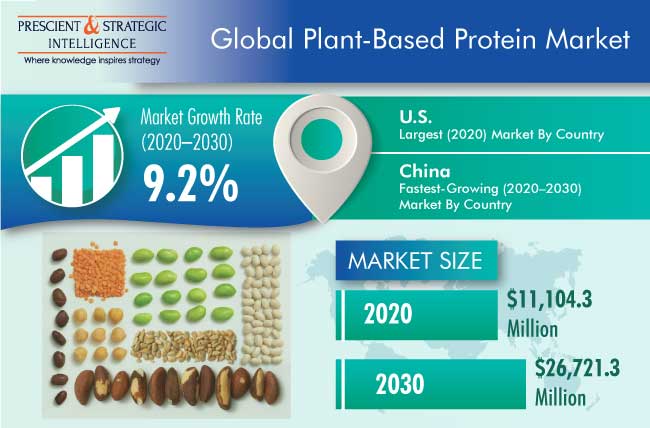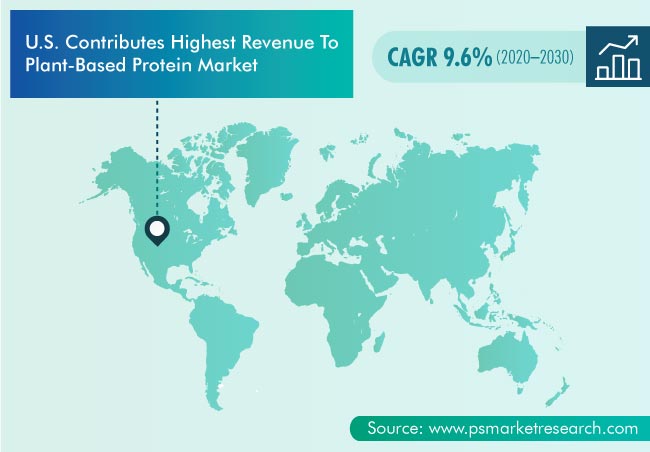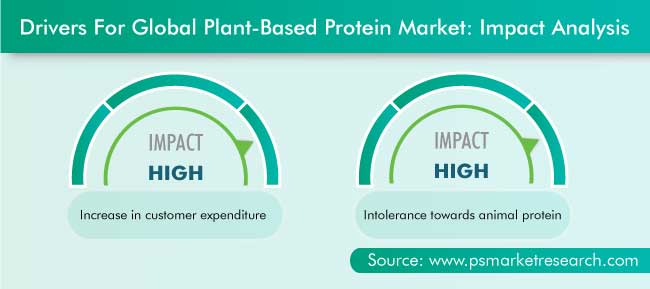Report Code: 12261 | Available Format: PDF | Pages: 273
Plant-Based Protein Market Research Report: By Source (Soybean, Wheat, Pea), Application (Food, Feed), Form (Dry, Liquid), Type (Isolated, Concentrated, Textured) - Global Industry Analysis and Growth Forecast to 2030
- Report Code: 12261
- Available Format: PDF
- Pages: 273
- Report Description
- Table of Contents
- Market Segmentation
- Request Free Sample
Market Overview
The global plant-based protein market generated $11,104.3 million revenue in 2020, and it is expected to grow at a CAGR of 9.2% during 2020–2030. This is attributed to the rising intolerance to animal protein, increasing customers’ expenditure, and growing awareness about healthy plant-based food.
COVID-19 led to an increase in alternative proteins because of the way the coronavirus disrupted the worldwide food chain. Moreover, because of the long duration of the outbreak, many people search for healthy food items, have started to find the alternative source of protein. Also, some companies have increased the production of plant-based protein as an alternative source of protein. Therefore, investments in alternative-protein companies have risen in recent years, as numerous start-ups sell plant-based protein, which in turn, led the growth of the market for plant-based protein.

Soybean Protein Source and Dry Protein Form Accounted for the Major Market Share
The soybean category held the largest share of the plant-based protein market, in 2020, based on source. This was primarily because soybeans are an excellent source of proteins and fat, and their high fiber content is beneficial to digestive health. Hence, there is a high demand for soybean to manufacture protein products and are being considered the best alternative for meat. In addition, these proteins are also used for various food applications, including emulsion-type sausages, dairy replacers, and nutritional bars; and are also used as nutritional ingredients in livestock feed, aquaculture, and pet food products.
The dry category held the larger share in 2020 in the market, based on form. This was primarily because dry food products are easy to handle and convenient to cook. Also, the demand for dry plant-based protein products has increased among millennials because plant-based proteins consist of low calories and fat, as compared to the animal proteins; due to which these are highly preferred by the athletes and fitness trainers.
Food Application and Textured Plant-Based Protein to Witness High Growth Rate
The food category is expected to witness the faster growth in the plant-based protein market during the forecast period (2021–2030), based on application. This is primarily due to the increasing demand for vegan food products, growing health & wellness trends, and changing lifestyle of the people. Moreover, according to the Plant Based Foods Association (PBFA), U.S. retail sales of plant-based foods grew 11.4% in 2019, bringing the total plant-based market value to $5 billion, which in turn is resulting in the rising demand for plant-based proteins in the food industry.
The textured category is expected to witness the fastest growth in the market for plant-based protein during the forecast, based on type. This is due to the fact that the textured proteins are highly nutritious and rich in fiber and protein, and it could also support heart health and protect against heart disease and stroke. Moreover, the growing demand for meat alternatives, to lower the rate for animal killings, is propelling the demand for textured protein. For instance, according to the Animal Legal Defense Fund, in the U.S., every year, more than 9 billion animals are raised and killed on factory farms.
North America Dominated the Market
North America is expected to hold the largest share during the forecast period due to the transition of consumers toward plant-based foods. This is fueled by the rising focus of people on personal health, sustainability, immunity, food safety, and animal welfare. Moreover, with the advancement of new technologies and innovative experiments in the food and beverage sector, the usage of plant-based protein has been dominant in the North American market, due to rise in vegan and flexitarian population.
Whereas, Asia-Pacific (APAC) region is expected to witness the fastest growth in the plant-based protein market, during the forecast period. This is majorly attributed to the changes in the eating habits of customers, along with the growing concern about health, environment, and ethical issues. These issues are leading to a rise in the vegan population, which is ultimately propelling the consumption of plant-based food products.

Consumers’ Shift toward Healthier Food Products Is Biggest Market Trend
The higher consumer demand for plant-based protein, is expected to increase the sales of the plant-based protein market, especially after the outbreak of COVID–19, as consumers are more concerned about their health than ever. According to reports, vegetarians are at a lower risk of heart diseases, high blood pressure, diabetes, and obesity. Although meat proteins provide the required amino acid content to the body, they are associated with high cholesterol levels and other related issues, as a result of which consumers across developed nations are preferring more of vegan protein sources.

Increased Consumer Expenditure and Intolerance to Animal Protein Boosted the Market Share
One of the major factors driving the market for plant-based protein is the increase in customer spending and improvement in the living standard of people across the world. According to the World Bank, the total consumer expenditure was $64.130 trillion in 2019 compared to $49.33 trillion in 2010. Thus, the increased consumer spending, couple with the rising awareness among consumers on the importance of a vegan diet for a healthy lifestyle will encourage them to invest more in plant-based food products.
Animal protein intolerance is on the rise, and its impact can be witnessed across most of the Western nations, which in turn, is driving the plant-based protein market. Regarding milk, the subsequent food allergy is presented as intolerance to lactose (the sugar in milk) or milk protein. The protein components present in milk trigger reactions to either the protein fractions in emulsion (caseins) or in whey (milk albumin). Cow's-milk protein allergy (CMPA) is the most-common food allergy of the early childhood, affecting almost 2% to 5% of the Brazilian child population less than three years of age.
| Report Attribute | Details |
Historical Years |
2015-2020 |
Forecast Years |
2021-2030 |
Base Year (2020) Market Size |
$11,104.3 Million |
Market Size Forecast in 2030 |
$26,721.3 Million |
Forecast Period CAGR |
9.2% |
Report Coverage |
Market Trends, Drivers, and Restraints, Revenue Estimation and Forecast, Segmentation Analysis, Country Breakdown, Impact of COVID-19, Companies’ Strategic Developments, Company Profiling |
Market Size by Segments |
By Source, By Application, By Form, By Type, By Region |
Market Size of Geographies |
U.S., Canada, U.K., Germany, France, Italy, Spain, China, Japan, India, South Korea, Australia, Brazil, Mexico, Saudi Arabia, South Africa |
Secondary Sources and References (Partial List) |
New Food Magazine, United Nations, World Bank, Healthline Media, U.S. National Library of Medicine, National Institutes of Health, U.S. Department of Agriculture, International Crops Research Institute for The Semi-Arid Tropics, Better Health Channel |
Explore more about this report - Request free sample
Market Players Involved in Mergers and Acquisitions to Gain Significant Position
The market is fragmented in nature with the presence of several key players. In recent years, players in the plant-based protein industry have been involved in mergers and acquisitions in order to attain a significant position. For instance:
- In September 2021, Koninklijke DSM N.V announced that it has agreed to acquire First Choice Ingredients, a provider of dairy-based savoury flavourings, for $453 million. With its headquarters in Germantown, Wisconsin, and three manufacturing facilities nearby, First Choice Ingredients and its approximately 100 employees develop clean-label, fermented dairy, and dairy-based savoury flavourings for taste and functional purposes.
- In August 2021, Cargill Incorporated agreed to acquire Aalst Chocolate Pte. Ltd., which was subjected to regulatory clearance and closing conditions, would considerably expand Cargill's APAC footprint by adding chocolate to its current range of cocoa products. By partnering, the two companies will provide customers with a reliable supply of cocoa and chocolate products, improved product sensory experience with their combined R&D competencies, and access to sourcing network that aims to sustain the cocoa sector for future generations through the Cargill Cocoa Promise.
Key Players in Global Plant-Based Protein Market Include:
- Archer Daniels Midland Company
- Cargill Incorporated
- Wilmar International Ltd.
- Roquette Frères
- Glanbia PLC
- Kerry Group PLC
- Koninklijke DSM N.V.
- BENEO GmbH
- Emsland Group
- Ingredion Inc.
- AGT Food and Ingredients
Market Size Breakdown by Segments
The plant-based protein market report offers comprehensive market segmentation analysis along with market estimation for the period 2015-2030.
Based on Source
- Soybean
- Wheat
- Pea
Based on Application
- Food
- Feed
Based on Form
- Dry
- Liquid
Based on Type
- Isolated
- Concentrated
- Textured
Geographical Analysis
- North America
- U.S.
- Canada
- Europe
- France
- Italy
- Germany
- U.K.
- Spain
- Asia-Pacific (APAC)
- China
- India
- Japan
- South Korea
- Australia
- Latin America (LATAM)
- Brazil
- Mexico
- Middle East and Africa (MEA)
- Saudi Arabia
- South Africa
The market for plant-based proteins valued $11,104.3 million in 2020.
The plant-based protein industry report has five segments: form, type, application, source, and region.
The key trend in the market for plant-based proteins is the shift of people to healthier food items.
APAC will be the fastest-growing plant-based industry market because of the rising environmental and animal health concerns, which are leading to the expansion of the vegetarian and vegan populations.
The market for plant-based proteins is fragmented due to the presence of numerous companies.
Want a report tailored exactly to your business strategy?
Request CustomizationWant an insight-rich discussion with the report author?
Speak to AnalystOur dedication to providing the most-accurate market information has earned us verification by Dun & Bradstreet (D&B). We strive for quality checking of the highest level to enable data-driven decision making for you
Our insights into the minutest levels of the markets, including the latest trends and competitive landscape, give you all the answers you need to take your business to new heights
With 24/7 research support, we ensure that the wheels of your business never stop turning. Don’t let time stand in your way. Get all your queries answered with a simple phone call or email, as and when required
We take a cautious approach to protecting your personal and confidential information. Trust is the strongest bond that connects us and our clients, and trust we build by complying with all international and domestic data protection and privacy laws